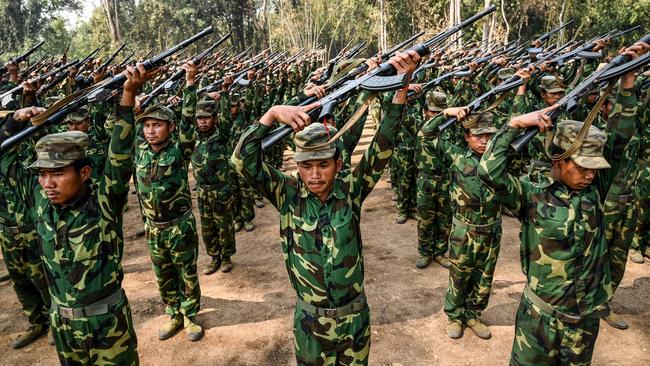Rebel victory exposes Myanmar junta’s weaknesses
The regime is facing mounting pressure from Beijing, which sent a senior envoy to Naypyidaw at the weekend to demand its border posts be safeguarded.

An unprecedented victory over Myanmar security forces in northeast Shan state by an alliance of ethnic armed groups has exposed key weaknesses in the junta’s capacity to defend territory and could signal a turning point for the resistance, analysts say.
The critical test will be the strength with which the regime hits back as it seeks to regain large tracts of ground lost to the so-called Brotherhood Alliance – the China-linked Myanmar National Democratic Alliance Army, Ta’ang National Liberation Army and the Arakan Army.
Fighting has raged for more than a week across a wide area of northeastern Shan state near the China border, forcing more than 23,000 people from their homes and inflicting heavy casualties on military forces that ousted the civilian government of Aung San Suu Kyi in a February 2021 coup.
Ethnic minorities in Myanmar’s border regions have long fought the Buddhist-majority state for control of their land and resources. But the success of the latest offensive has spurred resistance groups to step up their own attacks on regime targets elsewhere in Myanmar, putting further pressure on a military that is stretched paper thin.
Myanmar consultant David Mathieson says the so-called 1027 Operation was “one of the most daring and well-arranged offensives we have seen” involving multiple actors, including some elements of the resistance forces.
The armed groups have captured at least four towns, dozens of outposts and blocked vital trade routes to China, including the strategically important Chin Shwe Haw crossing on the Yunnan border through which hundreds of millions of dollars of goods are shipped annually.
Mr Mathieson said it was unlikely to be a knockout blow for the regime – which is expected to regain much of that territory in retaliatory ground and air attacks in coming weeks – but showed “you can inflict serious damage on the regime and seriously weaken them”. “It has given the resistance a huge psychological boost and is another major blow to the military. It goes to show they are increasingly on the back foot,” he said.
The regime is facing mounting pressure from Beijing, which sent a senior envoy to Naypyidaw at the weekend to demand it safeguard “the lives and property of Chinese border area residents, and take effective measures to strengthen the security of Chinese personnel, institutions and projects in Myanmar”.
China aims to build a billion-dollar rail route through the region as part of its global Belt and Road infrastructure project.
Senior General Min Aung Hlaing has vowed to “launch counter-attacks” against the armed groups, but the MNDAA claimed in a weekend statement that “most regime troops have lost the will to fight” and many had chosen to surrender in the face of the co-ordinated attacks.
Some of the fiercest fighting has been around Laukkai, a key centre in a region notorious for drugs, gun-running, prostitution and online scam factories, from which the MNDAA was ousted in 2009 and has been fighting to regain ever since.
International Crisis Group Myanmar researcher Richard Horsey said the 1027 offensive was not part of the broader revolution to oust the regime, but rather aimed at achieving more “parochial concerns”, primarily to regain control of lucrative criminal enterprises.
Still, the three armed groups had provided training to resistance forces and, with their attack, opened an “unwelcome additional front” for the military at a time it could ill afford it.
“There will be a counter-strike from the regime which will be fascinating,” Mr Horsey said.
“Then we will find out if they still have the capacity to pull together a decisive response. It is the question everyone has been asking; how much has this stretched the military? Do they have the manpower, the morale, the ability to take on another front?
“I think the answer probably is yes … but if it seems in the next few weeks that there’s a great weakness that is very dangerous to the regime, because it will embolden the resistance and the ethnic armed groups.”




To join the conversation, please log in. Don't have an account? Register
Join the conversation, you are commenting as Logout